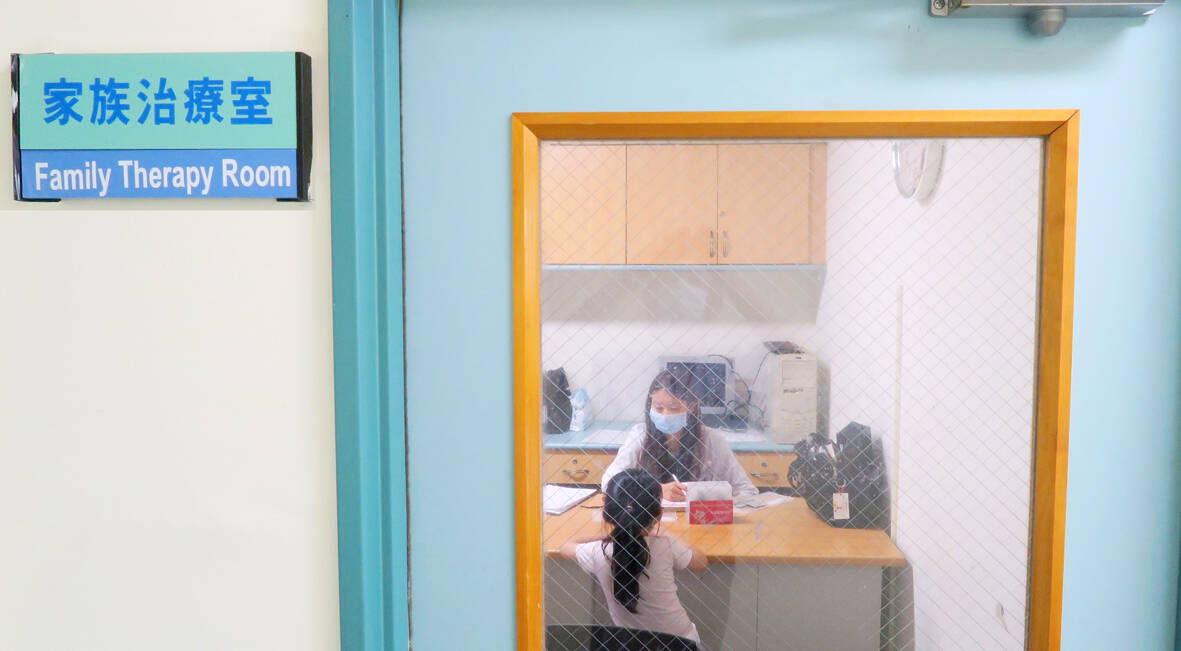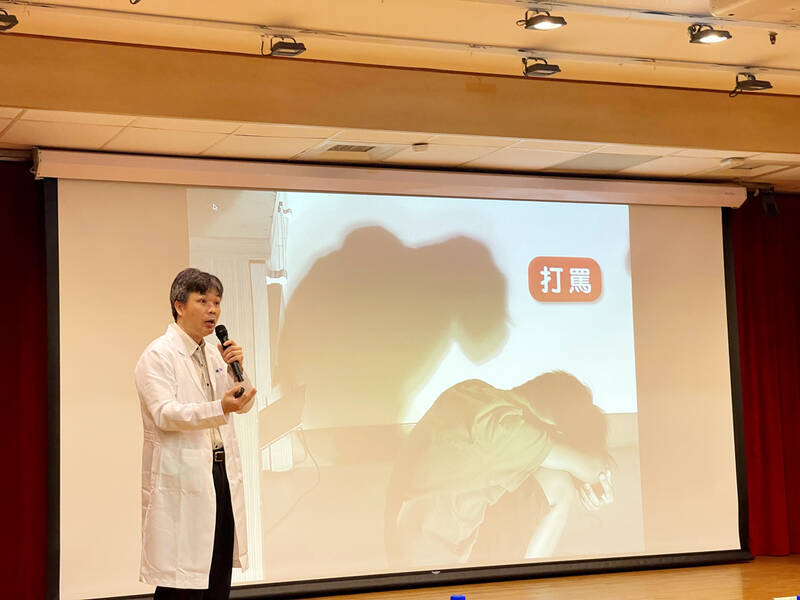Last week, representatives of an association of youth organizations challenged the presidential candidates in the upcoming election to articulate their positions on the extension of conscription to one year, a voting age of 18, housing justice, traffic safety, work environments and youth mental health.
While most of the issues they listed have constantly been in the news, the last has less prominence on the media radar, yet it is an urgent problem, one I see every day. Taiwan’s youth in many ways are in the midst of a growing mental health crisis.
Suicide rates are often a gross indicator of mental health. As both government data and numerous studies show, suicide rates among the young have been rising since around 2014, after falling for the previous decade (this rise is a global issue). At present, suicide is the number two cause of death in the 15-24 age group, while suicide rates for other groups fall.

photo: Tsai Shu-yuan, Taipei Times
The culprits are obvious, from school pressure to family break-ups to the Internet.
Readers will be familiar with the current lawsuit against Meta (Facebook) over its effects on kids. Screen time isn’t just bad for children directly: it also affects them through lost maternal attention. A study this year found increased ADHD among Taiwanese children whose mothers had more than three hours of screen time a day.
WIDESPREAD PROBLEMS

photo courtesy of Changhua Hospital
Suicide is a prominent indicator of system failure, but other problems are widespread. Another indicator of the rising mental health problems of the young is doctor visits. National Health Insurance (NHI) system statistics show that visitors to psychiatric clinics aged 15-30 increased from 221,000 in 2016 to 292,000 in 2021. According to local media reports, anxiety and depression are increasing.
Sleep disorders among youth have been identified as major independent drivers of suicide and depression in several studies in Taiwan. Children in Taiwan stay up to do the appalling quantities of homework the system loads them with, then stay up even later on the Internet with their friends. The result is a host of disorders. Research also shows that harsh discipline many Taiwanese children receive from parents creates depression, especially in females.
Taiwan’s mad boss culture hurts children in countless ways, some not immediately apparent. For example, a study this year found that maternal job stress during pregnancy is associated with higher levels of ADHD in children. The brutal hours at school, apparently intended to prepare students to acclimate students to their future work lives, mean that less than 15 percent of students reported that they liked school in a February survey by the Taiwan Child Welfare League Foundation.

photo: Hsu Li-chuan, Taipei Times
In Taiwan, according to a 2004 study, adolescents who realize they have a mental issue prefer to listen to music and wait for it to go away, which scholars believe may play a role in the high rates of suicide ideation in Taiwan. For many years I have heard students tell me their hobby is “listening to music,” a phrase which now has more ominous overtones for me.
This dovetails the Child Welfare League Foundation survey, which found that 17 percent of children said they would not talk with others about their emotional issues, 40.6 percent said they would talk to their parents, and only 5.6 percent said they would seek counseling from their school.
PARENTAL DENIAL
This issue is compounded by the widespread inability of individuals and parents in local culture to admit that there are problems and seek help, meaning that people only see therapists when their problems are severe, and that mental health services in Taiwan are actually underutilized, according to some scholars.
Parental denial is an issue that every teacher will be familiar with. I have been teaching in Taiwan for three decades now, watching all sorts of broken children float past me, carried away on currents of denial.
It is impossible to get them help. Parents become angered and blame the teacher if they are told their child should be evaluated by a therapist. If by some miracle they see a therapist, children are more likely to be medicated than to receive the therapy they need, according to school administrators and teachers I have talked to — one of the consequences of having a one-size-fits-all national health care system.
Studies of Taiwanese schools for the period 2000-2011 showed that the rate of ADHD among children aged 8-14 in Taiwan was 8.74 percent, whereas the prevalence of treated ADHD was just 1.24 percent. And of that fraction, a study this year of prescription of medications for ADHD between 2004 and 2017 found that roughly 57 percent of ADHD sufferers were medicated.
The situation for schools is rough. Most schools lack in-house processes and resources for handling children with mental health issues. The cookie-cutter educational system means kids who are different are weeded out. There is little recourse for a teacher to have a student of theirs evaluated, even when they think they are a danger to themselves, or to those around them.
Worse, schools are now required to take students even when they have no way to provide services for their problems. These problems go double for English language immersion programs and other experimental or unusual schools, which parents view as dumping grounds for children with learning or emotional issues.
FORWARD LOOKING
Fortunately in this area, unlike so many others, the Democratic Progressive Party (DPP) has been forward looking. In August, the Ministry of Health and Welfare launched a one-year program for subsidized psychiatric consultations with a budget of NT$28.8 million, which was increased to NT$107 million to meet high demand. DPP presidential candidate William Lai (賴清德) said last week that if elected president, he will expand the new subsidy scheme for youth mental health, currently available for people aged 15-30, to include children aged 6-14. Lai also promised to expand the number of community mental health centers from 38 to 100 by 2028.
This is a good beginning, but we need resources and personnel in the school system to help students with mental health issues. Above all, we need some celebrity to take this cause in hand and give it publicity.
Not only lives are at stake, but happiness as well.
Notes from Central Taiwan is a column written by long-term resident Michael Turton, who provides incisive commentary informed by three decades of living in and writing about his adoptive country. The views expressed here are his own.

Climate change, political headwinds and diverging market dynamics around the world have pushed coffee prices to fresh records, jacking up the cost of your everyday brew or a barista’s signature macchiato. While the current hot streak may calm down in the coming months, experts and industry insiders expect volatility will remain the watchword, giving little visibility for producers — two-thirds of whom farm parcels of less than one hectare. METEORIC RISE The price of arabica beans listed in New York surged by 90 percent last year, smashing on Dec. 10 a record dating from 1977 — US$3.48 per pound. Robusta prices have

A dozen excited 10-year-olds are bouncing in their chairs. The small classroom’s walls are lined with racks of wetsuits and water equipment, and decorated with posters of turtles. But the students’ eyes are trained on their teacher, Tseng Ching-ming, describing the currents and sea conditions at nearby Banana Bay, where they’ll soon be going. “Today you have one mission: to take off your equipment and float in the water,” he says. Some of the kids grin, nervously. They don’t know it, but the students from Kenting-Eluan elementary school on Taiwan’s southernmost point, are rare among their peers and predecessors. Despite most of

The resignation of Taiwan People’s Party (TPP) co-founder Ko Wen-je (柯文哲) as party chair on Jan. 1 has led to an interesting battle between two leading party figures, Huang Kuo-chang (黃國昌) and Tsai Pi-ru (蔡壁如). For years the party has been a one-man show, but with Ko being held incommunicado while on trial for corruption, the new chair’s leadership could be make or break for the young party. Not only are the two very different in style, their backgrounds are very different. Tsai is a co-founder of the TPP and has been with Ko from the very beginning. Huang has

A few years ago, getting a visa to visit China was a “ball ache,” says Kate Murray. The Australian was going for a four-day trade show, but the visa required a formal invitation from the organizers and what felt like “a thousand forms.” “They wanted so many details about your life and personal life,” she tells the Guardian. “The paperwork was bonkers.” But were she to go back again now, Murray could just jump on the plane. Australians are among citizens of almost 40 countries for which China now waives visas for business, tourism or family visits for up to four weeks. It’s